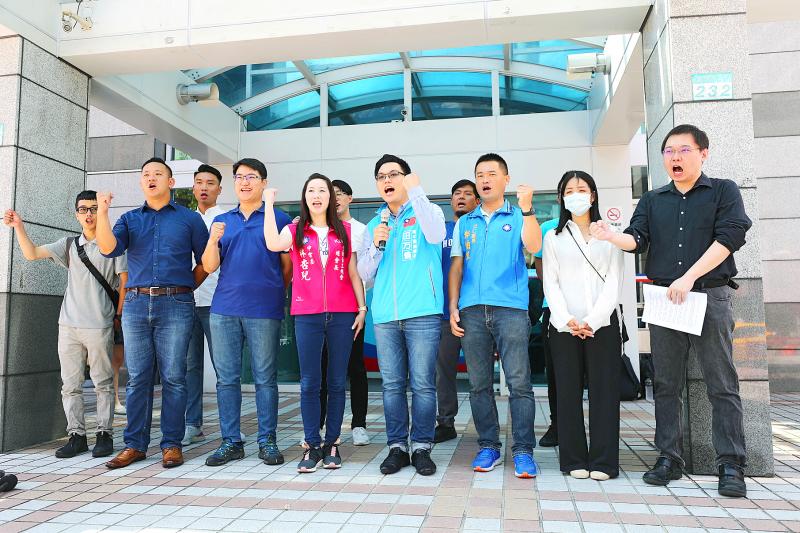Several members of the Chinese Nationalist Party (KMT) Reform Committee’s youth participation task force yesterday voiced their support for recommendations made by the committee’s cross-strait narrative task force and said they were not abandoning the “1992 consensus.”
The so-called “1992 consensus,” a term former Mainland Affairs Council chairman Su Chi (蘇起) in 2006 admitted making up in 2000, refers to a tacit understanding between the KMT and the Chinese Communist Party that both sides of the Taiwan Strait acknowledge there is “one China,” with each side having its own interpretation of what “China” means.
The KMT’s reform committee, of which KMT Chairman Johnny Chiang (江啟臣) is the general convener, is divided into four task forces focused on cross-strait narrative, organizational reform, youth participation and financial stability.

Photo: CNA
On Friday last week, the groups held their first joint meeting, during which the cross-strait narrative task force proposed “four pillars”: insisting on the sovereignty of the Republic of China (ROC); safeguarding freedom, democracy and human rights; prioritizing the safeguarding of Taiwan’s security; and creating a win-win situation and “shared prosperity.”
Speaking outside the KMT headquarters in Taipei yesterday, Taichung City Councilor Lo Ting-wei (羅廷瑋), a member of the youth participation task force, said that while some people who rely on history for a “sense of presence” might feel that their contributions are being erased, the committee was not erasing the “1992 consensus,” but rather hoped to add to the KMT’s narrative.
Lin Hsing-er (林杏兒), head of the KMT Department of National Youth Affairs and a member of the youth participation task force, said that young people are unfamiliar with the “1992 consensus.”
She compared the “consensus” to a point-and-shoot camera, saying it was no longer “in fashion.”
The KMT has never removed the “consensus” from its discourse, she said, but it should be repackaged into something that young people can understand.
Another member of the youth participation task force, Taipei City Councilor Hsu Chiao-hsin (徐巧芯), said that while some people question whether the KMT’s cross-strait narrative is moving closer to that of the Democratic Progressive Party (DPP), the reverse was true.
She said that the KMT should place its focus not on whether or not it wants the “1992 consensus,” but rather on the challenges the “consensus” faces and supervision of the ruling DPP.
Members of the youth participation task force also expressed their support for fellow member Kaohsiung City Councilor Jane Lee (李眉蓁), who on Tuesday was named the party’s candidate in the Kaohsiung mayoral by-election to be held on Aug. 15.
In related developments, former president Ma Ying-jeou (馬英九) yesterday on Facebook called on President Tsai Ing-wen (蔡英文) to acknowledge the “1992 consensus” to prevent the two sides of the Taiwan Strait from going to war.
Ma also called on Chinese authorities to stop menacing Taiwan with force.
Additional reporting by CNA

DAREDEVIL: Honnold said it had always been a dream of his to climb Taipei 101, while a Netflix producer said the skyscraper was ‘a real icon of this country’ US climber Alex Honnold yesterday took on Taiwan’s tallest building, becoming the first person to scale Taipei 101 without a rope, harness or safety net. Hundreds of spectators gathered at the base of the 101-story skyscraper to watch Honnold, 40, embark on his daredevil feat, which was also broadcast live on Netflix. Dressed in a red T-shirt and yellow custom-made climbing shoes, Honnold swiftly moved up the southeast face of the glass and steel building. At one point, he stepped onto a platform midway up to wave down at fans and onlookers who were taking photos. People watching from inside

A Vietnamese migrant worker yesterday won NT$12 million (US$379,627) on a Lunar New Year scratch card in Kaohsiung as part of Taiwan Lottery Co’s (台灣彩券) “NT$12 Million Grand Fortune” (1200萬大吉利) game. The man was the first top-prize winner of the new game launched on Jan. 6 to mark the Lunar New Year. Three Vietnamese migrant workers visited a Taiwan Lottery shop on Xinyue Street in Kaohsiung’s Gangshan District (崗山), a store representative said. The player bought multiple tickets and, after winning nothing, held the final lottery ticket in one hand and rubbed the store’s statue of the Maitreya Buddha’s belly with the other,

‘NATO-PLUS’: ‘Our strategic partners in the Indo-Pacific are facing increasing aggression by the Chinese Communist Party,’ US Representative Rob Wittman said The US House of Representatives on Monday released its version of the Consolidated Appropriations Act, which includes US$1.15 billion to support security cooperation with Taiwan. The omnibus act, covering US$1.2 trillion of spending, allocates US$1 billion for the Taiwan Security Cooperation Initiative, as well as US$150 million for the replacement of defense articles and reimbursement of defense services provided to Taiwan. The fund allocations were based on the US National Defense Authorization Act for fiscal 2026 that was passed by the US Congress last month and authorized up to US$1 billion to the US Defense Security Cooperation Agency in support of the

HIGH-TECH DEAL: Chipmakers that expand in the US would be able to import up to 2.5 times their new capacity with no extra tariffs during an approved construction period Taiwan aims to build a “democratic” high-tech supply chain with the US and form a strategic artificial intelligence (AI) partnership under the new tariffs deal it sealed with Washington last week, Taipei’s top negotiator in the talks said yesterday. US President Donald Trump has pushed Taiwan, a major producer of semiconductors which runs a large trade surplus with the US, to invest more in the US, specifically in chips that power AI. Under the terms of the long-negotiated deal, chipmakers such as Taiwan Semiconductor Manufacturing Co (TSMC, 台積電) that expand US production would incur a lower tariff on semiconductors or related manufacturing